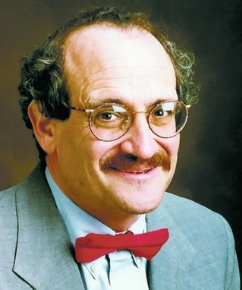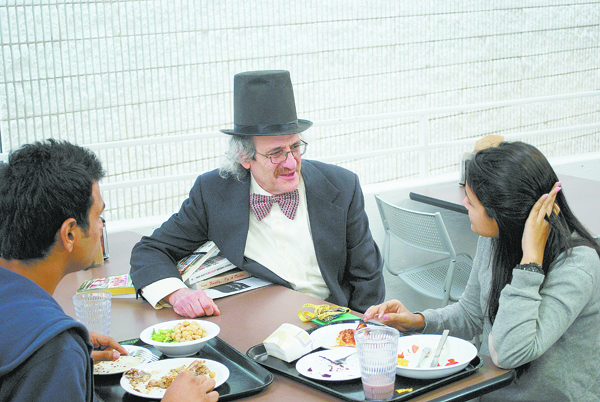
Former Associate Professor of Internal Medicine Neil Shulman (71M, 72MR) died on Nov. 6. Courtesy of Emory University
Former Associate Professor of Internal Medicine Neil Shulman (71M, 72MR), who was known by colleagues and friends for his quirky attitude and distinct sense of humor, died on Nov. 6 at 78 years old. Shulman, a researcher, writer, humanitarian and comedic actor, is survived by his wife, Anna Zoe Haugo, and their 17-year-old son, Myles Shulman.
Shulman dedicated much of his life to Emory University. He briefly practiced medicine at Grady Memorial Hospital after his graduation from Emory’s School of Medicine, seeing patients, conducting research and setting up inner-city medical clinics, before coming back to teach at the Emory School of Medicine until his recent retirement in 2021, Haugo said.
Throughout his life, Shulman authored or co-authored more than 30 books and over 50 scientific papers. Additionally, he received over $8 million worth of grants from the National Institutes of Health (NIH) and was a co-investigator in cardiovascular clinical research at the NIH. Shulman devoted much of his work to decreasing high blood pressure prevalence in rural and inner-city areas.
Jimmy Carter Presidential Library Public Affairs Director Tony Clark recalled that Shulman did whatever he could to help people. He first met Shulman during the library’s Author Lecture Series, which Shulman would later attend as a speaker in 2012 and 2014 to discuss his books “The Corporate Kid” and “Second Wind,” respectively.
“He would fight for people who didn’t have anyone to fight for them,” Clark said. “That was what made him special.”
Shulman was deeply committed to his family, maintaining his connection to their son until the end of his life. Haugo sees her husband in Myles, adding that they share the same mannerisms, desire to talk to new people and ability to make people laugh.
“Even in the end when he didn’t always remember exactly who Myles was, he still was able to inhabit the same intimate connection with him,” Haugo wrote in a follow-up email.
According to Haugo, Shulman would visit his mother, who had Alzheimer’s disease, and bring her flowers, repeatedly presenting her with the same bouquet. She would reply with the same joyful response. Near the end of Shulman’s life, Myles would play similar jokes on his father.
Shulman cared about everyone, regardless of who they were. He helped uninsured employees on Emory’s campus obtain quality health care, and would “drop everything to escort them over to the hospital and walk them through the red tape and bureaucracy,” Haugo said.
Shulman would want to be remembered for advocating for people unable to attain quality health care, Haugo added, noting that he cared about everyone, regardless of who they were. He helped uninsured employees on Emory’s campus obtain health care, and would “drop everything to escort them over to the hospital and walk them through the red tape and bureaucracy.” Shulman also organized the Global Health and Humanitarian Summit, which the Emory School of Medicine hosts to educate local participants on humanitarian work.
“He didn’t care about rules and regulations,” Haugo said. “What he cared about was people getting the health care they needed.”
Shulman’s philanthropy extended beyond medicine, working with Haugo to put on a Festival of Faiths at Emory to educate students on various faiths and encourage religious tolerance. Another year, Haugo and Shulman organized a soccer match and fundraiser at Emory called Soccer for Peace, which sent soccer equipment to peacekeepers in Sudan to play the sport with Sudanese refugees.
In addition to his work in health care, Haugo said Shulman would want people to remember him for his work in literature and film. Much of Shulman’s later life was dedicated to performances. He, along with Patch Adams, a doctor who is the subject of the 1998 film “Patch Adams” in which he is portrayed by Robin Williams, toured together as a clowning and comedic act titled “Laughter is the Best Medicine.” Shulman also performed as Dr. Neil the Banana Peel in “What’s in a Doctor’s Bag?,” a live show based on his children’s book of the same title dedicated to helping young people get over their fears of going to the doctor.
Clark reflected on how Shulman helped those around him, saying that he was “one of a kind.”
“He touched a lot of lives,” Clark said. “I am better for having known him.”

Former Associate Professor of Internal Medicine Neil Shulman (71M, 72MR) has a conversation with students in the dining hall. (The Emory Wheel)
Additionally, Shulman developed his own show called “Laughing with Seniors” after co-writing a comedic novel about nursing homes titled “Second Wind” with P.K. Beville in 1995. Using the novel as inspiration, Beville went on to found Second Wind Dreams, a nonprofit dedicated to changing perceptions around aging through education and fulfillment of the dreams of older people.
Haugo noted that Second Wind Dreams was “extra meaningful” to her husband and requested that people donate to the organization in lieu of sending flowers.
Shulman also garnered national attention when his 1979 novel “What? Dead Again?” inspired the hit 1991 film “Doc Hollywood,” for which he was an associate producer. Warner Bros. Entertainment distributed the movie, with screenwriters Peter Seaman and Jeffrey Price traveling to Georgia during the film’s production.
According to Haugo, Seaman and Price jokingly asked Dr. Shulman if people wore shoes in Georgia, and he responded by showing up to the airport with no shoes on. He wore a white coat and stethoscope and proceeded to drive Price and Seaman around Georgia in a rented ambulance, Haugo wrote in a follow-up email.
Shulman remained connected with Emory as he navigated his career in humor writing, continuing to teach and recruiting journalist Carl Hiaasen (74C), who was an English major and a writer for The Emory Wheel at the time, to help him write both “What? Dead Again?” and “Finally … I’m a Doctor,” a 1976 novel humorously recounting his time in medical school, Haugo said.
The Wheel featured Shulman in a 2013 article, which described him as a “campus character.” Shulman constantly looked for the opportunity to converse with strangers on campus, often sitting down at tables in the dining hall to talk with students. According to the article, Shulman had handfuls of conversations ranging from 15 to 45 minutes with people in the dining hall every day, with some of those conversations going on to become “the start of friendships.”
Shulman did not care whether others judged his clumsiness, untamed hair or tendency to carry around a stack of jam-packed manilla folders in lieu of a briefcase.
“Whether they laughed at me or with me, it makes no difference,” Shulman said in 2013. “I am making them happy.”
Haugo also remembered her husband’s inquisitive disposition toward others.
“He used to say that … the people in the world are like a library of books, and he likes to go through the aisles of the library and pull out books,” Haugo said.
In an email to Shulman after the inaugural Rosalynn Carter Institute Gala Celebration of Caregivers in 2004, former U.S. First Lady Rosalynn Carter praised Shulman.
“You warm the hearts and lighten the spirits of all those whose lives you touch,” Carter wrote.
Shulman’s legacy at Emory is still alive through his work, with Haugo noting that his first novel, “Finally … I’m a Doctor,” is deeply connected to the University. She said that she would like to donate copies of his book to anybody who wants one, adding that people who are interested in receiving a copy can email her.
“It does feel like he is living on with us through all of these wonderful connections with incredible people that were introduced to me through Neil,” Haugo said.
Hilary Barkey (she/her) (25Ox) is from New York City and plans on majoring in neuroscience and behavioral biology. When she’s not studying on the Quad, you can find her playing tennis, reading or talking about baseball and hockey to anyone who will listen.






